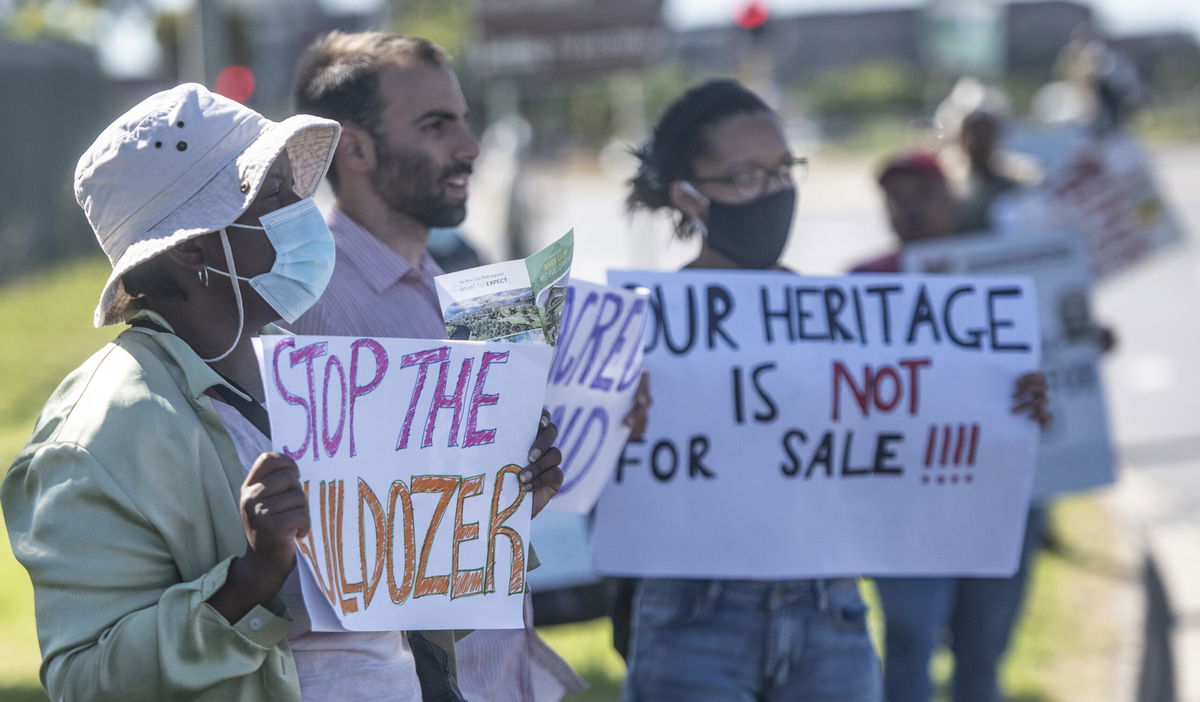Court halts construction of Amazon’s Africa HQ on sacred land

Protesters during the Liesbeek Action Campaign on November 2021 in Cape Town
By Anna Cooban, CNN Business
A South African judge has put the brakes on a $270 million real estate project that includes a regional headquarters for Amazon, saying that indigenous people who consider the land to be sacred must be consulted.
Judge Patricia Goliath said in a ruling on Friday that Liesbeek Leisure Properties Trust (LLPT), owner of the 37-acre site in Cape Town, must stop construction immediately pending “proper and meaningful consultation” with the Khoi and San indigenous populations.
“This matter ultimately concerns the rights of indigenous peoples,” Goliath said in the ruling, which was shared with CNN Business by the Observatory Civic Association, one of the parties that brought the case, as well as the property’s developer.
The Khoi and San peoples have inhabited South Africa for thousands of years. The residential and commercial development is being constructed at the confluence of two rivers, near grazing lands that hosted ceremonies and where indigenous people fought European invaders, the ruling said.
The area was first developed by South African Railways decades ago as a recreational space for its workers. A golf course, restaurants and offices have since been added, according to the ruling.
Amazon declined to comment on Monday. The US tech giant “is the intended anchor tenant” for the site and “was consulted and accommodated in the design and layout” of parts of the development, according to the ruling.
The City of Cape Town — which is listed as a respondent in the case — said last year that the 4 billion rand ($268 million) site would house Amazon’s African headquarters. The complex will also include hotel, residential and retail space.
LLPT said in a statement Monday that it was “deeply disappointed” by the ruling and was considering its options. In 2020, it said the project would “boost the economy and people of Cape Town” and create more than 6,000 jobs.
South Africa has an unemployment rate of nearly 35%.
Goliath said that her order requiring consultation “should not be construed as criticism against the development.” But she said the rights of indigenous people outweigh economic considerations.
“The fact that the development has substantial economic, infrastructural and public benefits can never override the fundamental rights of First Nations Peoples,” she wrote.
The Liesbeek Action Campaign, which is fighting the development, welcomed the court’s decision, and said the site represents the “Ground Zero of resistance to colonial intrusion in South Africa … that can never be buried in concrete.”
Not all indigenous groups oppose the site, however, complicating the way forward in a country where indigenous people have endured decades of colonial rule and apartheid policy.
“The current tension amongst First Nations Groups strengthens the need for meaningful engagement and proper consultation,” said Goliath.
The-CNN-Wire
™ & © 2022 Cable News Network, Inc., a WarnerMedia Company. All rights reserved.